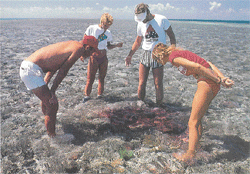In warm waters
 According to a study conducted by the National Oceanic Atmospheric Administration, us, 1998 was the warmest year in 1,200 years . The rate of warming has also been on the rise since the 1970s, says a National Aeronautics and Space Administration study. This gives many scientists reason to believe that corals are but a victim of global warming. "The severity and extent of coral bleaching events cannot be accounted for by localised stresses alone. At this time, it appears that only global warming could have induced such extensive bleaching simultaneously throughout the disparate reef regions of the world,' says Rafe Pomerance, deputy assistant secretary of state for environment and development, in a report presented to the us Coral Reef Task Force in March 1999.
According to a study conducted by the National Oceanic Atmospheric Administration, us, 1998 was the warmest year in 1,200 years . The rate of warming has also been on the rise since the 1970s, says a National Aeronautics and Space Administration study. This gives many scientists reason to believe that corals are but a victim of global warming. "The severity and extent of coral bleaching events cannot be accounted for by localised stresses alone. At this time, it appears that only global warming could have induced such extensive bleaching simultaneously throughout the disparate reef regions of the world,' says Rafe Pomerance, deputy assistant secretary of state for environment and development, in a report presented to the us Coral Reef Task Force in March 1999.
The study conducted by Pomerance and his team members, which is also said to be the most complete documentation of the problem ever, concluded that record ocean temperatures caused the largest die-off of corals in recorded history and catalogued coral decline in 60 countries. Last year's temperatures in the Indian Ocean, for instance, were about 2
Related Content
- Affidavit filed by the MoEF&CC related to reduction of glacier sizes leading to an increase in moraine-dammed lakes in Himachal Pradesh and Tibet, 22/04/2025
- UN World Water Development Report 2025
- Reply affidavit Ministry of Jal Shakti on the impact of climate change on Himalayan glaciers, 07/03/2025
- Heat action plan for Thane city 2024: making Thane a heat-resilient smart city through reduced impacts of heatwaves
- State of the cryosphere 2023: two degrees is too high
- 2023 state of climate services: health
